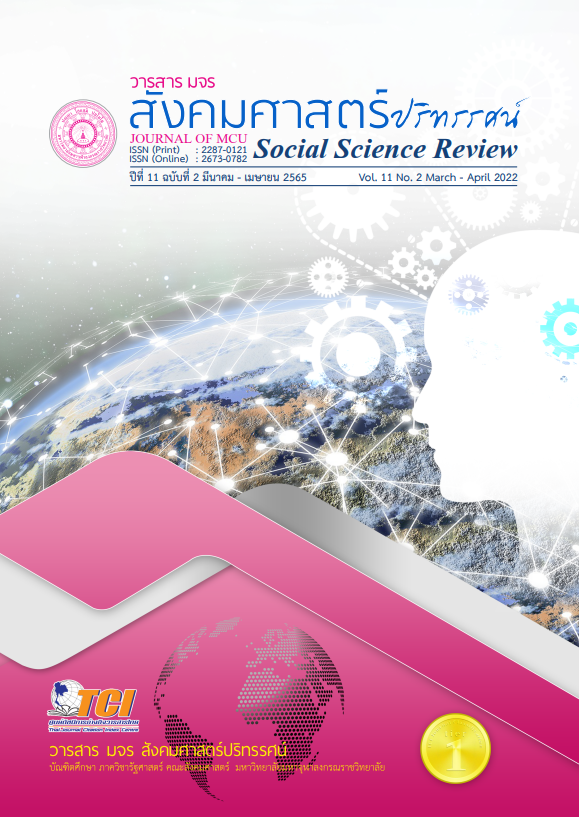รูปแบบการบริหารจัดการวัดที่เป็นสำนักปฏิบัติธรรมในจังหวัดสระบุรี
คำสำคัญ:
การบริหารจัดการ, สำนักปฏิบัติธรรม, จังหวัดสระบุรีบทคัดย่อ
บทความวิจัยนี้มีวัตถุประสงค์เพื่อศึกษาสภาพทั่วไป ปัจจัยที่ส่งผลและนำเสนอรูปแบบ การบริหารจัดการวัดที่เป็นสำนักปฏิบัติธรรมในจังหวัดสระบุรี เป็นการวิจัยเชิงคุณภาพ เก็บข้อมูลภาคสนามโดยการสัมภาษณ์เชิงลึกผู้ให้ข้อมูลสำคัญ 25 รูปหรือคน ได้ใช้แบบสัมภาษณ์แบบมีโครงสร้าง ที่มีค่าดัชนีวัดความเที่ยงตรงเชิงเนื้อหาทั้งฉบับ (S-CVI) เท่ากับ 1.00 เป็นเครื่องมือในการเก็บรวบรวมข้อมูล และการสนทนากลุ่มเฉพาะร่วมกับผู้ทรงคุณวุฒิ จำนวน 8 รูปหรือคน โดยวิเคราะห์ข้อมูลด้วยเทคนิคการวิเคราะห์เนื้อหาประกอบบริบท
ผลการวิจัยพบว่า 1. สำนักปฏิบัติธรรมในจังหวัดสระบุรีมีพื้นที่ มีสภาพแวดล้อมทางกายภาพที่มีความสัปปายะและมีพระวิปัสสนาจารย์ผู้ทรงความรู้ด้านกรรมฐานเป็นการเฉพาะ 2. ปัจจัยที่ส่งผลต่อการบริหารจัดการ คือ การบริหารบุคคล งบประมาณของภาครัฐ วัสดุอุปกรณ์ และการจัดการ 3. รูปแบบการบริหารจัดการวัดที่เป็นสำนักปฏิบัติธรรมในจังหวัดสระบุรี โดยการบูรณาการกับหลักอิทธิบาท 4 ประกอบด้วย 1) ฉันทะ : รักและศรัทธาในการทำงาน 2) วิริยะ : มีการพัฒนาสม่ำเสมอและต่อเนื่อง 3) จิตตะ : กล้าเสนอ กล้าคิด กล้าตัดสินใจ 4) วิมังสา : ไตร่ตรองด้วยปัญญา
เอกสารอ้างอิง
กองพุทธศาสนศึกษา สำนักงานพระพุทธศาสนาแห่งชาติ. (2553). สำนักปฏิบัติธรรมประจำจังหวัดดีเด่นประจำปี 2553. กรุงเทพฯ: โรงพิมพ์สำนักงานพระพุทธศาสนาแห่งชาติ.
ณัฎฐวรรณ พงษ์อินทราภรณ์. (2564). ความพึงพอใจของสตรีต่อการปฏิบัติธรรมในวัดหนองบัวหิ่ง อำเภอปากท่อ จังหวัดราชบุรี. วารสารพุทธนวัตกรรมและการจัดการ, 4(2), 48-56.
ณัฐกานต์ บุญแนบ. (2562). การนำหลักพุทธธรรมมาปลูกฝังให้กับต้นกล้าที่เป็นเยาวชนซึ่งเป็นอนาคตของชาติ. วารสารสหวิทยาการนวัตกรรมปริทรรศน์, 2(2), 55-64.
พระครูวิสุทธานันทคุณ (สุรศักดิ์ วิสุทฺธาจาโร). (2558). การบริหารจัดการวัดเพื่อความมั่นคงแห่งพระพุทธศาสนา (ดุษฎีนิพนธ์พุทธศาสตรดุษฎีบัณฑิต สาขาวิชาการจัดการเชิงพุทธ). พระนครศรีอยุธยา: มหาวิทยาลัยมหาจุฬาลงกรณราชวิทยาลัย.
พระครูสมุห์พรชัย ธีรปญฺโญ. (2563). การพัฒนาการบริหารจัดการสำนักปฏิบัติธรรมประจำจังหวัดเพชรบุรีในอำเภอบ้านลาด จังหวัดเพชรบุรี. วารสารพุทธนวัตกรรมและการจัดการ, 3(1), 1-10.
พระทรงศักดิ์ ถิรธมฺโม. (2564). ผลสัมฤทธิ์จากการปฏิบัติธรรมของประชาชนที่วัดมเหยงคณ์จังหวัดพระนครศรีอยุธยา. วารสารพุทธนวัตกรรมและการจัดการ, 4(1), 57-64.
พระพิพัฒน์ โสภณจิตฺโต ทับงามและคณะ. (2563). รูปแบบการบริหารจัดการของสำนักปฏิบัติธรรม ประจำจังหวัดอ่างทอง เพื่อเสริมสร้างศักยภาพทางปัญญา. วารสารสันติศึกษาปริทรรศน์ มจร, 8(1), 222-232.
พระมหานพดล ปุญฺญสุวฑฺฒโก. (2560). ประสิทธิผลการบริหารจัดการสำนักปฏิบัติธรรม (ดุษฎีนิพนธ์พุทธศาสตรดุษฎีบัณฑิต สาขาวิชาการจัดการเชิงพุทธ). พระนครศรีอยุธยา: มหาวิทยาลัยมหาจุฬาลงกรณราชวิทยาลัย.
พระสมุห์สุรินทร์ รตนโชโตและคณะ. (2562). ความพึงพอใจของพุทธศาสนิกชนที่มีต่อการจัดปฏิบัติธรรมของวัดป่าพุทธาราม อำเภอโพธาราม จังหวัดราชบุรี. วารสารสหวิทยาการนวัตกรรมปริทรรศน์, 2(2), 1-10.
สำนักงานกองทุนสนับสนุนการสร้างเสริมสุขภาพ (สสส.). (2559). วัดสร้างสุข โลกแห่งสัปปายะ. กรุงเทพฯ: โครงการวัดสร้างสุข สมาคมส่งเสริมเทคโนโลยี (ไทย-ญี่ปุ่น).
สำนักงานจังหวัดสระบุรี. (2561). แผนพัฒนาจังหวัดสระบุรี (พ.ศ. 2561 – 2564). สระบุรี:สำนักงานจังหวัดสระบุรี.
สำนักงานส่งเสริมพระกรรมฐาน เมือง สระบุรี. (2563). สำนักปฏิบัติธรรมที่ประกาศเป็นทางการจังหวัดสระบุรี. สืบค้น 15 พฤษภาคม 2563, จาก http://www.madchima.org
ดาวน์โหลด
เผยแพร่แล้ว
รูปแบบการอ้างอิง
ฉบับ
ประเภทบทความ
สัญญาอนุญาต
ลิขสิทธิ์ (c) 2022 วารสาร มจร สังคมศาสตร์ปริทรรศน์

อนุญาตภายใต้เงื่อนไข Creative Commons Attribution-NonCommercial-NoDerivatives 4.0 International License.
เพื่อให้เป็นไปตามกฎหมายลิขสิทธิ์ ผู้นิพนธ์ทุกท่านต้องลงลายมือชื่อในแบบฟอร์มใบมอบลิขสิทธิ์บทความให้แก่วารสารฯ พร้อมกับบทความต้นฉบับที่ได้แก้ไขครั้งสุดท้าย นอกจากนี้ ผู้นิพนธ์ทุกท่านต้องยืนยันว่าบทความต้นฉบับที่ส่งมาตีพิมพ์นั้น ได้ส่งมาตีพิมพ์เฉพาะในวารสาร มจร สังคมศาสตร์ปริทรรศน์ เพียงแห่งเดียวเท่านั้น หากมีการใช้ภาพหรือตารางหรือเนื้อหาอื่นๆ ของผู้นิพนธ์อื่นที่ปรากฏในสิ่งตีพิมพ์อื่นมาแล้ว ผู้นิพนธ์ต้องขออนุญาตเจ้าของลิขสิทธิ์ก่อน พร้อมทั้งแสดงหนังสือที่ได้รับการยินยอมต่อบรรณาธิการ ก่อนที่บทความจะได้รับการตีพิมพ์ หากไม่เป็นไปตามข้อกำหนดเบื้องต้น ทางวารสารจะถอดบทความของท่านออกโดยไม่มีข้อยกเว้นใดๆ ทั้งสิ้น





